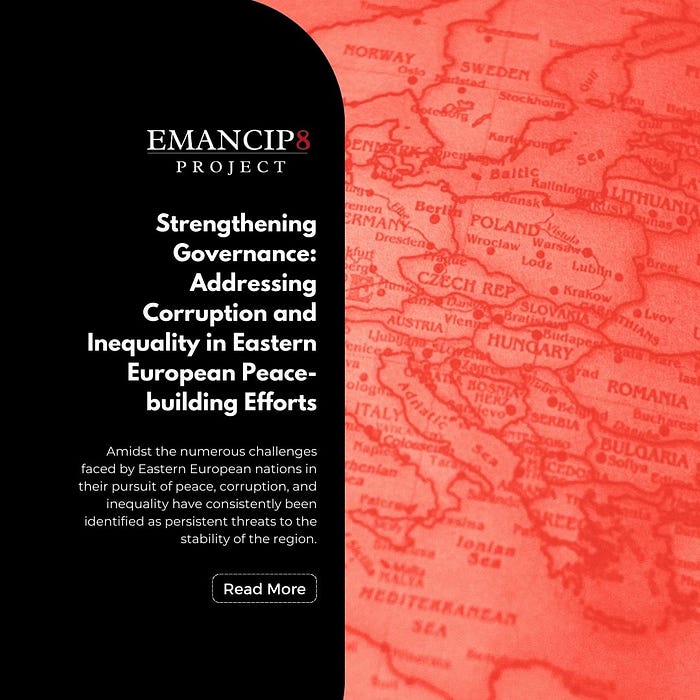Strengthening Governance: Addressing Corruption and Inequality in Eastern European Peace-building Efforts by Emancip8 Project

Amidst the numerous challenges faced by Eastern European nations in their pursuit of peace, corruption, and inequality have consistently been identified as persistent threats to the stability of the region. As peace-building experts and policymakers grapple with the complexities of these issues, a deeper understanding of the interrelationship between governance, corruption, and inequality is essential to devise effective strategies for sustainable peace. This article explores the dynamics of corruption and inequality in Eastern European peace-building efforts, highlighting the significance of robust governance frameworks in addressing these challenges and fostering lasting peace.
Corruption in the region is deeply entrenched, permeating various levels of government and impeding the peace-building process (Chayes, 2015). This scourge not only hinders the delivery of essential public services but also exacerbates social and economic inequalities, undermining the legitimacy of state institutions and fueling unrest. In turn, inequality further exacerbates corruption by creating an environment where public officials are more prone to engage in rent-seeking behavior (You & Khagram, 2005). Consequently, addressing both issues is paramount for successful peace-building.
To tackle corruption and inequality, enhancing transparency and accountability is crucial. Strengthening the rule of law, bolstering judicial independence, and promoting civil society engagement are integral components of this endeavor (Johnston, 2011). The implementation of effective anti-corruption measures, such as establishing independent anti-corruption agencies and creating legal frameworks to protect whistleblowers, can also contribute to reducing corruption and fostering trust in state institutions (Galtung, 2006).
Inclusive economic policies are equally vital in addressing inequality and supporting peace-building. Redistribution mechanisms, such as progressive taxation and targeted social assistance programs, can help mitigate income disparities, while investments in education and healthcare can enhance human capital and social mobility (Stiglitz, 2012). Furthermore, fostering inclusive political processes, such as decentralization and participatory decision-making, can empower marginalized communities and promote social cohesion (Mansuri & Rao, 2013).
Regional cooperation and international support play a pivotal role in combating corruption and promoting equitable development. Initiatives such as the European Union’s Eastern Partnership and the United Nations Development Programme’s anti-corruption projects in Eastern Europe offer valuable platforms for knowledge exchange, technical assistance, and capacity-building (Fagan, 2016).
In conclusion, addressing corruption and inequality in Eastern European peace-building efforts necessitates comprehensive governance reforms and inclusive policies. By fostering transparency, accountability, and social equity, these measures can contribute to the consolidation of peace and stability in the region.
References:
Chayes, S. (2015). Thieves of State: Why Corruption Threatens Global Security. New York: W. W. Norton & Company.
Fagan, A. (2016). Europe’s Balkan Dilemma: Paths to Civil Society or State-building? London: I.B. Tauris.
Galtung, F. (2006). Measuring the Immeasurable: Boundaries and Functions of (Macro) Corruption Indices. In A. S. K. (Eds.), Measuring Corruption (pp. 101–130). Aldershot: Ashgate.
Johnston, M. (2011). Syndromes of Corruption: Wealth, Power, and Democracy. Cambridge: Cambridge University Press.
Mansuri, G., & Rao, V. (2013). Localizing Development: Does Participation Work? Washington, DC: World Bank.
Stiglitz, J. E. (2012). The Price of Inequality: How Today’s Divided Society Endangers Our Future. New York: W. W. Norton & Company.
You, J. S., & Khagram, S. (2005). A Comparative Study of Inequality and Corruption. American Sociological Review, 70(1), 136–157.
Read more at Emancip8 Project.
Comments
Post a Comment